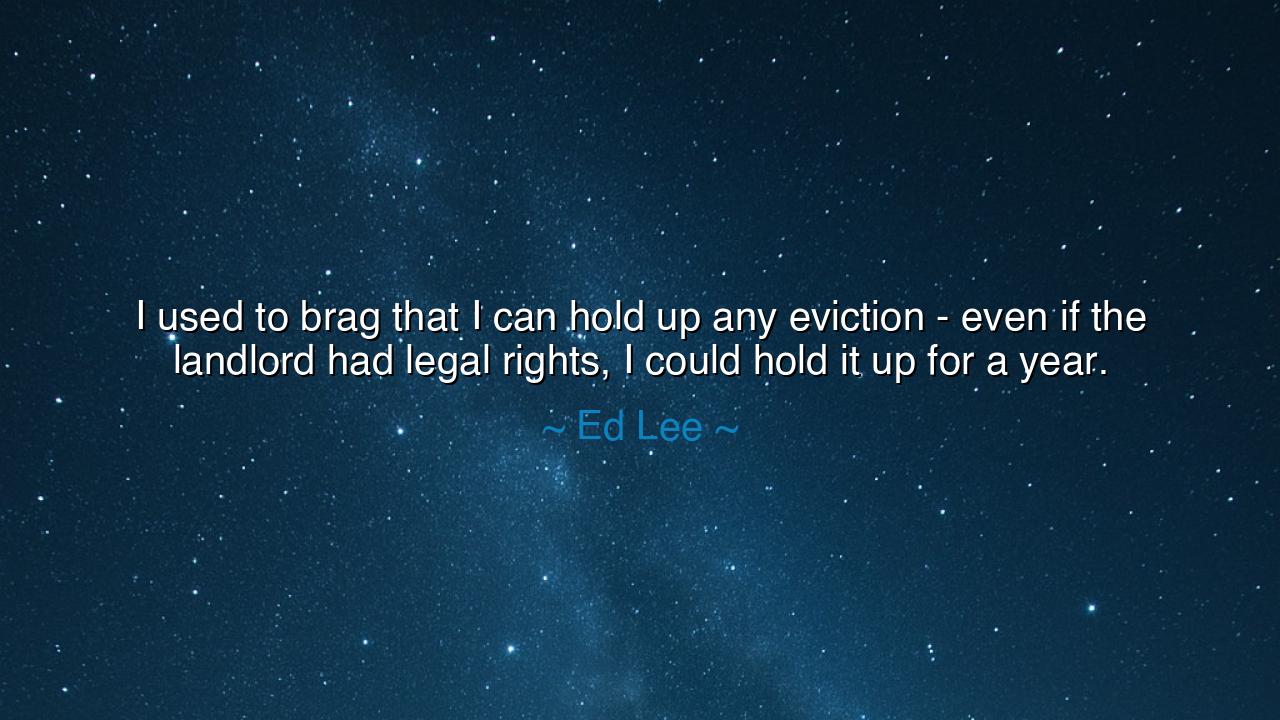
I used to brag that I can hold up any eviction - even if the
I used to brag that I can hold up any eviction - even if the landlord had legal rights, I could hold it up for a year.






Hear the voice of Ed Lee, the son of immigrants who rose to become mayor of San Francisco, who once confessed with candor: “I used to brag that I can hold up any eviction—even if the landlord had legal rights, I could hold it up for a year.” These words, at first glance boastful, are in truth a window into a deeper struggle—the clash between law and compassion, between property rights and human survival, between the letter of legality and the spirit of justice.
When Lee spoke of holding up an eviction, he revealed the heart of his early work as a civil rights lawyer, defending tenants in a city where the rising cost of housing pushed the poor to the brink of homelessness. To “hold it up” meant not to deny the landlord’s rights altogether, but to give the tenant time—time to breathe, time to find shelter, time to survive. In those moments, the law became a shield, wielded not for profit but for mercy, for though the landlord had legal rights, the tenant had human needs that law too often ignored.
The phrase “even if the landlord had legal rights” carries profound weight. It admits the paradox that legality does not always equal morality. A law may grant the power to remove, but does that make it just to do so? History is filled with such questions: laws have once sanctioned slavery, segregation, and exploitation, yet the brave dared to resist in the name of a higher justice. In Lee’s words we hear the echo of this eternal tension—the struggle to balance what is written with what is right.
Consider the story of the Great Depression of the 1930s, when countless families faced eviction from their homes and farms. In some towns, neighbors banded together to block sheriffs from throwing families into the streets. They were not denying the written law, but appealing to a deeper truth—that survival of the people outweighed the claims of debt and title. These acts of resistance, like Lee’s defense of tenants, remind us that the law is not meant to crush the vulnerable but to protect the common good.
The deeper meaning of Lee’s words is this: the true power of law lies not only in its rigidity but in its capacity for mercy. To wield the law with skill is noble; to wield it with compassion is greater still. A society that values only the rights of ownership while neglecting the needs of the poor builds its house upon sand, for when inequality grows too great, the foundation of peace crumbles. Lee’s “brag” was, in truth, the boast of one who used his gifts to defend the powerless against forces far larger than themselves.
This is not to deny the rights of landlords, nor to scorn property, but to remind us that all rights exist within a greater web of responsibility. The home is not merely a building of walls and roofs; it is the sanctuary of families, the cradle of dreams, the fortress of dignity. To strip it away lightly, even when the law allows, is to wound the very fabric of community. And so Lee’s words call us to remember that justice is not only about what can be done, but about what ought to be done.
Children of tomorrow, let this wisdom take root in your hearts: never cling so tightly to the letter of the law that you forget the spirit of humanity. If you hold power—whether in courts, in offices, or in your daily dealings—use it not only to uphold rules but to lift the vulnerable. Seek balance between rights and compassion, between order and mercy. Stand with those who have little, even when the world insists the law is against them.
Thus the teaching of Ed Lee endures: that legal rights are not the highest good, but must be tempered by justice, compassion, and humanity. To defend the poor against eviction, even for a year, was to declare that people are not expendable. Carry this lesson forward: that law is strongest when it serves life, and that justice is fullest when it remembers mercy.






AAdministratorAdministrator
Welcome, honored guests. Please leave a comment, we will respond soon